Last Farewell
Are you sure about this?
She stares at me with those sad brown eyes. I take a deep breath, determined to stay strong.
“Yes, I’m sure.”
But why now? Why at all?
“Because I can’t stay stuck here forever. I need to start making things happen for myself.”
Can’t I come with you?
I shake my head. “Not this time. You’ve been wonderful and I couldn’t have gotten this far without you, but now it’s time to move on.”
Aren’t you scared?
“Are you kidding?” I smile in an awkward attempt to keep from crying. “I’ve never been more terrified of anything in my life.”
It’s not too late to turn back, you know.
“Hey, I never said I was too scared.”
Something about her laughter reassures me. Maybe I can do this after all.
So what will you do now?
I shrug. “Keep writing the same way I always have. You’re just the mask. Everything else is already mine.”
And you’ll be okay not having me to hide behind anymore?
I pause and breathe a heavy sigh. “Honestly, I can’t be sure yet. All I know is that I’m tired of hiding.”
You realize there’s no going back from this. Once you let me go, you’ll be on your own. Are you ready to be yourself, your real self?
I smile again. “Who else am I going to be?”
Although she doesn’t respond, I already know what she’s thinking. Five years. That’s nothing to sneeze at.
“I am going to miss you.” This time, I can’t stop the tears. “You know that, right?”
Somehow she manages a smile through her own tears.
You’ll be fine. They’re going to love you.
“How do you know that?”
Like you said, I’m just the mask. You’re right, you don’t need me anymore. Maybe you never did. Everything you need is already yours. So don’t be afraid. Just get out there and be you.
I brush the tears off my face. “I will. Promise.”
We both reach a hand toward each other. Our fingers almost touch across the void, perfectly symmetrical through the glass. Though her face never changes, I can feel her fading away, until at last I’m left looking at nothing but a nameless reflection.
What’s in a name? The face in the mirror has always been mine. Soon everyone else will see it too. No longer a persona, just me.
Goodbye, Ms. Wolfe.
Update on the Dragon Story Experiment: More Beta Reader Feedback + Final Draft in Progress
It’s been another month since my last update on my dragon stories! Last time, I shared some of the feedback I’d received from beta readers on my first two stories while the last one had yet to be edited and sent out. After sending out all three stories and receiving more feedback from readers, here’s another quick update on my project and where I plan to go from here!
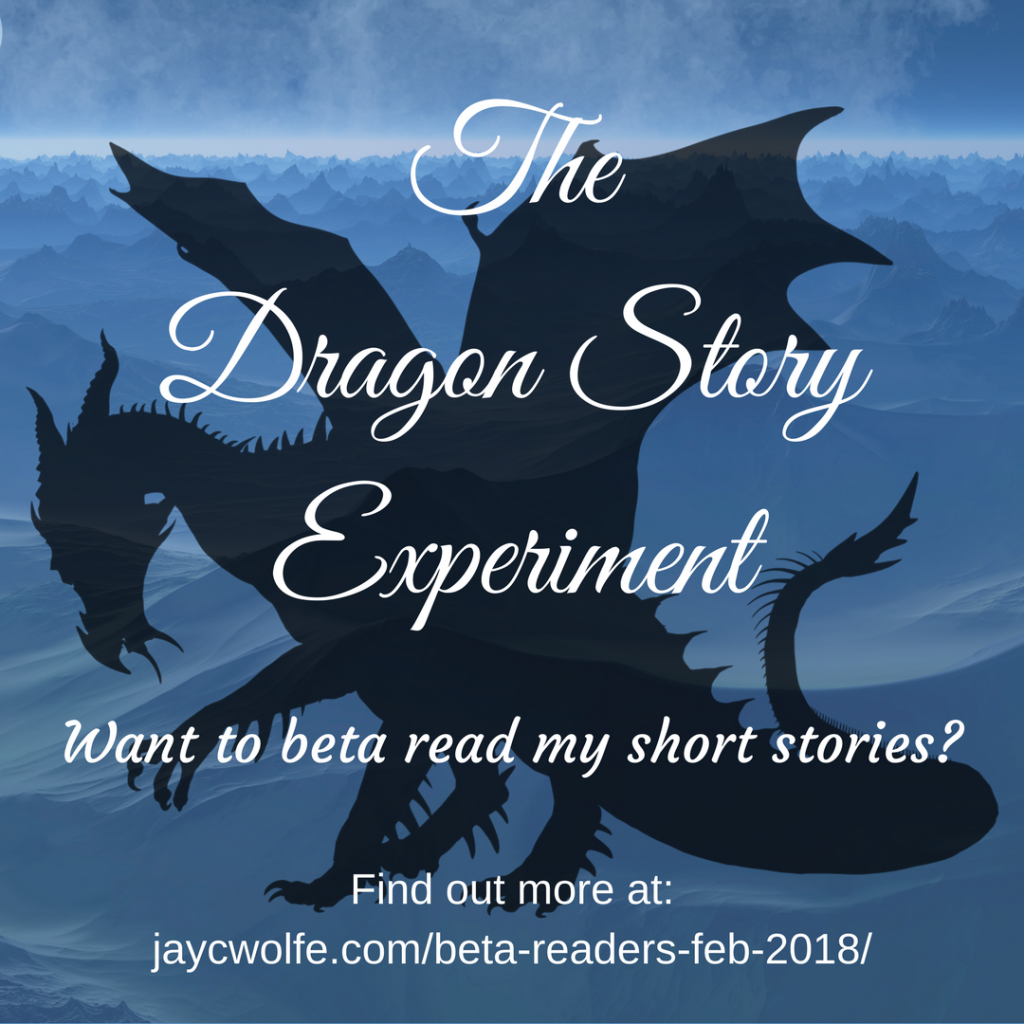
Beta Reader Feedback
So far, all three of my stories have been very well received! Of course, that doesn’t mean they’re perfect, and my beta readers certainly had some great notes to share over the past several weeks!
Based on their feedback, it seems a couple of my biggest weaknesses in writing are passive voice and awkward sentences. This isn’t really a surprise; I’ve caught myself favoring passive voice over active voice more times than I’d care to admit, and even I find some of my own sentences awkward after a few rounds of editing. Despite everything I’ve learned about writing, I still have a handful of bad habits to break!
One thing that did surprise me was someone’s comment that the action in “Defender” was written very well. Action scenes have long been one of the areas I’ve felt least confident in, so hearing that my extra effort paid off definitely put a spring in my step that day! I was also surprised to hear that “Beastly Pains” is very reminiscent of the fable of “The Lion and the Mouse” (not that this is a bad thing, I just hadn’t realized it), and that “The Silver Queen” made one of my readers cry!
Overall, although there have been a couple of comments here and there that were hard to hear, I’m extremely grateful to the readers who have taken the time to read my stories and give feedback. Every comment, both positive and negative, helps me become a better writer!
Final Edits + Publication
Although my stories are technically still open for feedback from beta readers, I’m already getting started on the final drafts. Once those are done, I plan to assemble them into a single ebook and publish it on Kindle!
Now before you say anything, I know this sounds a little crazy. What am I thinking publishing these stories without giving them to an editor first?
Well, as I’ve hinted at before, this isn’t so much a true self-publishing venture as it is an experiment. I’m planning to use these stories to test certain aspects of self-publishing and see how readers respond to my writing so I can learn from the experience. I promise I have no intention of publishing my future “real” books without handing them over to a professional editor first! That would be insane!
The main reason I’m okay with putting this book out there in such a raw state is that I’m going to be rebranding myself as an author soon. This will be the only book I publish under my current name; after my upcoming blog relaunch, I’ll be focusing on a fresh series of stories to properly self-publish under my new author name, hopefully with a little more wisdom about the process!
What blog relaunch and new author name, you ask? You’ll have to wait until next week to learn more. 😉
Thanks again to all my beta readers for your feedback! If you’re not one of my beta readers yet but would like to be, you still have time to sign up for my mailing list! Once my final drafts are nearly ready, I’ll be closing my list, so be sure to sign up soon!
Word of the Week: Effloresce
Word: effloresce
Pronunciation: e-flə-RES
Part of Speech: verb
Definition:
- lose moisture and turn to a fine powder upon exposure to air
- reach an optimum stage of development; blossom
Source: Oxford Dictionaries
Here’s another word I learned from the 100 most beautiful words in English. Spring is finally here, so what better time to learn a word related to flowers and blossoming? If you’re inspired to write floral poetry this season, you may find it fun to describe the way the flowers “effloresce”!
To “effloresce” is to blossom or reach an optimum stage of development. To “effloresce” is also to lose moisture and turn to a fine powder upon exposure to air. The word arose in the late 18th century and comes from the Latin verb efflorescere, meaning “to bloom”. This verb comprises the preposition e- “out” and the verb florescere “begin to bloom”, the latter of which derives from the noun floris “flower”.
While the more obvious definition of “effloresce” is “to blossom” due to its relation to the word “flower”, it also functions as a chemistry term referring to salts that crystallize on a surface or to a surface that becomes covered with salt particles. The noun form “efflorescence” is also a chemistry term for the migration of salts through a porous surface (though I much prefer its other meaning: “blossoming”). Be careful not to confuse the verb “effloresce” with “effervesce” (“to give off bubbles” or “to be vivacious and enthusiastic”) or the adjective “efflorescent” with “evanescent” (“soon passing out of sight, memory, or existence”)! If you love writing about flowers or other things that bloom, “effloresce” may be a great word to include in your vocabulary!
What are your thoughts on this word? Any suggestions for future “Word of the Week” featured words?
Emotions on a Blank Page (Colleen’s Weekly #Poetry Challenge – #Haibun)
The blank page stares at me, teasing me, mocking me, daring me to write something, anything. I frown back at the white screen, my mind still empty as ever. I reach into the void for any words that will break the block. Why won’t they come? I stare harder, seething at the space I wish would fill itself. Oh, how much I could write just about the frustration of having nothing to say… I stop. I smile. Yes, yes. Fingers to keys, I begin to type. The words come easily now. From rage comes enlightenment, from enlightenment comes triumph. Before I know it, I’m grinning at a finished poem. At last, I’ve conquered the blank page.
Anger fuels the fire
Until all falls into place
And my smile returns
Happiness comes in flashes
But such is a writer’s life!
My response to Colleen Chesebro‘s Weekly Poetry Challenge #76: Joy & Fury. The twist is to only use synonyms for the prompt words! For this challenge, I chose to write a haibun about the emotional rollercoaster that is writing. I hope you enjoy the poem! Thanks for the prompt, Colleen!
3 Pieces of Advice No Writer Should Ever Forget
Writing is incredibly rewarding, but it can also be extremely challenging. Every artist is unique and every writer has their reasons for wanting to write, yet there are some pieces of advice that hold true for all creative spirits. Whenever you find yourself at a low point, reminding yourself of this advice may be the motivation you need to get back to writing!
So for those of you who so nobly chose to be writers, here are three pieces of advice you should never forget. Enjoy, and stay motivated!
1) Writing isn’t always easy, but you should do it anyway.
I hate writing. I love having written. –
Dorothy Parker/ every writer ever
I’ve said it before and I’ll say it again: writing is the hardest thing ever! Not always, but enough of the time to disillusion the most resilient of idealists.
Writing has its ups and downs. Sometimes inspiration strikes and you stay up until 3 a.m. finishing your latest chapter. Other times you get stuck or work for days straight only to have to throw all those pages out by the final draft. It’s enough to drive anyone crazy!
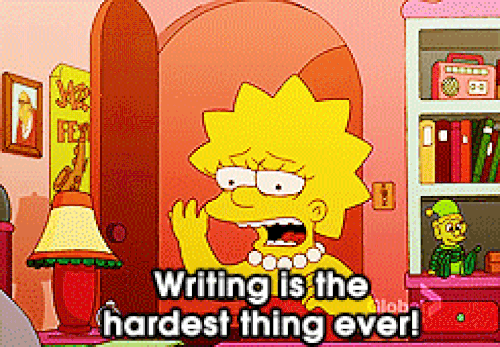
And yet you keep writing anyway. Why? Because deep down you know that even at its worst, writing is worth doing. It’s liberating. It exercises your imagination. It’s one of the greatest ways to express yourself. And you just love it. As much as you hate it sometimes, you love it. And if you can turn that passion into something beautiful? Well, congratulations: you’re a true writer!
Why do you write? Only you can answer that question for yourself. But whatever the reason you became a writer, it matters. So make it count.
2) The first audience you should ever try to please is yourself.
Better to write for yourself and have no public, than to write for the public and have no self. – Cyril Connolly
This may seem obvious, but at some point in the writing process, many writers fall into the trap of people-pleasing. Will my friends and family like this? Will my editor like this? Will my target audience like this? What if nobody likes it? Maybe I should change it.
Yes, writing with an audience in mind is important: we want readers to love our work so we can sell more books and be successful. The trick is finding the overlap between what people want to read and what you want to write.
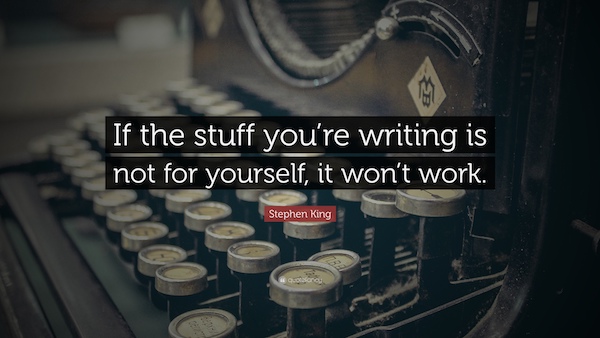
Maybe you want to capitalize on the latest trends in fiction or adjust your style to appeal to a wider audience. But if you try to write an edgy dystopian sci-fi novel when you only like writing Christian historical romance, the quality of your work will suffer. Readers can tell when your heart isn’t in it.
Whenever you sit down to write something new, make sure it’s a story you want to tell. Otherwise you’ll end up with a book that you didn’t want to write and that no one wants to read—nobody wins. Write for yourself first, worry about everyone else later.
3) It doesn’t matter if it’s been done before; if it’s never been done by you, go for it!
There is no one alive who is Youer than You. – Dr. Seuss, Happy Birthday to You!
Human beings are funny creatures. We encourage individuality and freedom of expression, yet we do everything in our power to fit in with everyone else just so we can be accepted by our peers.
As much as art thrives on individuality, writers suffer from this conflict too. We want to stand out, but we can’t be too different or no one will read our books. As a result, many of us find ourselves caught in the dilemma of wanting to tell a story but worrying that “it’s been done before.”
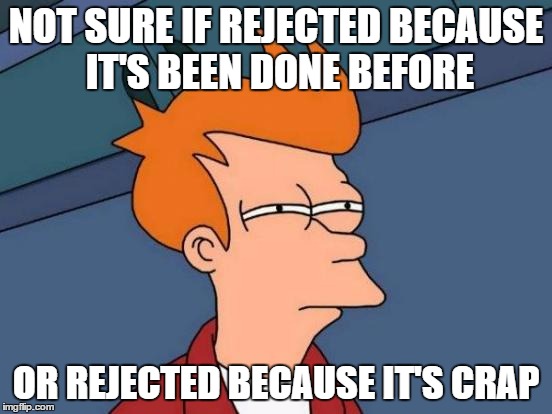
But here’s the truth: it’s not so much about the story you tell as it is about how you tell it.
Think about it: if Shakespeare already wrote the quintessential story of forbidden love with Romeo & Juliet, then how did West Side Story win so many awards? If anyone can just read a history book or a Wikipedia article, then why is it virtually impossible to get tickets to see Hamilton? Why do people continue to write novels and make movies when every work of fiction can be boiled down to one of seven basic plots?
Simple: the story may be the same at its core, but the way it’s told makes it different and interesting. In other words, it’s your voice that will make your story unique.
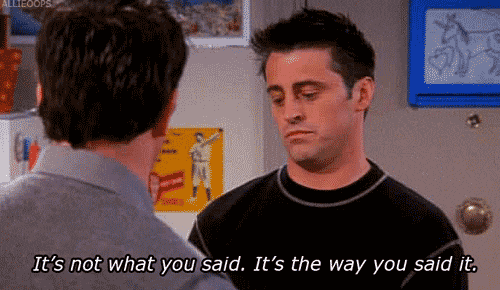
The fact is that every story told since the Age of Antiquity has already been done. What matters is that it’s never been done by you. No one else has your voice, so don’t be afraid to let the world hear it.
What advice about writing do you find most helpful? What other pieces of advice would you add to this list?


Recent Comments